Geena Davis launches Hollywood festival for women
- Published
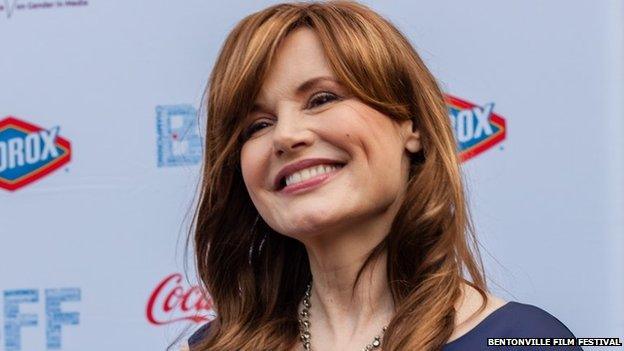
Geena Davis set up the Institute on Gender in Media in 2004
Actress Geena Davis was so disappointed with the disparity of screen time between men and women that she founded a film festival to both highlight the problem and showcase the work of female talent in the industry.
She described the festival in Bentonville, Arkansas, as "making Hollywood history" - showing only films promoting women and diversity. But in 2015, is such an event really necessary?
Oscar and Golden Globe winner Davis, who turns 60 next year, believes so. Famous for playing strong women characters such as wayward runaway housewife Thelma in Ridley Scott's 1991 road movie Thelma and Louise; pioneering baseball player Dottie Hinson in A League of Their Own; or President Mackenzie Allen in TV show Commander in Chief; in 2004 she started the Geena Davis Institute on Gender in Media "after watching TV with my daughter and wondering, 'where are all the girls?'" she says.
Davis's organisation has done the first research in to on-screen gender diversity in two decades. She claims that her results, which looked at female characters in popular films across 11 countries, including the UK, are sobering.
"The ratio of men to women on screen is at exactly the same levels as in 1946. It hasn't moved. We've calculated that at the current rate, it's going to take 700 years to achieve on-screen equality in films and television. Clearly, we need to lose a couple of zeros from that analysis."
According to the Institute's research, the disparity is at its worst in children's programming - with one girl on screen for every three boys. Even in mainstream films and TV shows, the research claims that there are three men with speaking parts for each woman.
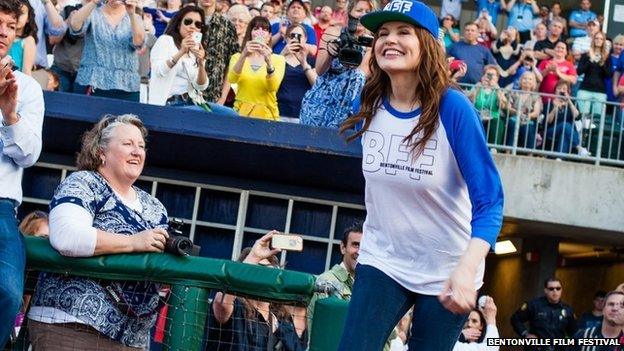
Davis played a pioneering baseball player in A League of Their Own
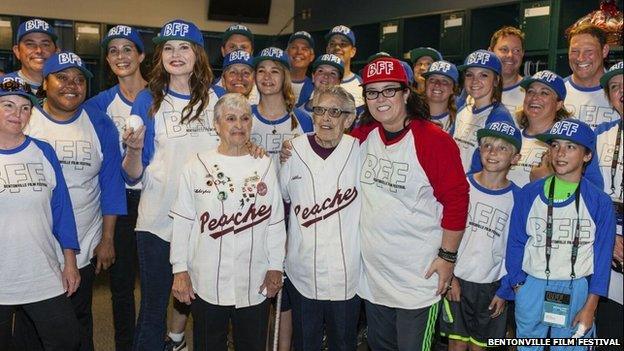
Bentonville Film Festival
"Women have just not been there on screen," the actress continues. "And if they are there, they're not doing inspiring things. Female characters working in science, technology, engineering and maths are outnumbered seven to one by males. Only 7% of judges are played by women, and only 4% of sports characters.
"I believe we're teaching kids to have an unconscious bias against girls, that they're just serving the function of beauty.
"So that's why there's a need for this event," she says. "There is gender inequality, and the fastest way to fix it is to fix it through media and then life will imitate art."
To qualify for the festival, a film had to either star a woman, have a diverse cast, or have either a female director, writer or producer.
Davis calls the ratio of women filmmakers to men in the US "appalling" - the latest figures from the Directors Guild of America, released in 2013, put the number of women directors who were members at around 5%.
A further incentive to come to Bentonville rested with the guarantee that winning films will get distribution with the US media sponsors the festival attracted - US supermarket Walmart, the AMC movie chain, or video streaming site Vudu.
"This is intentionally a highly visible and highly commercial festival," she says. "While the there are equal numbers of male and female film students in most countries, it drops off sharply afterwards.
"We need financial momentum to get things going, and I want to show how vital and commercial these kinds of films can be. We want people to want to come here, knowing they can get a film deal, but in order to qualify they need to hire more women and more minorities.
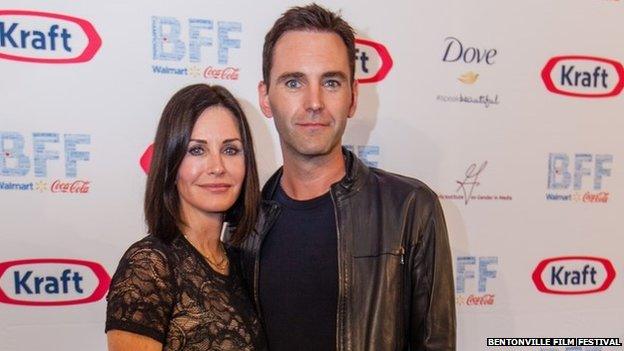
Actress Courtney Cox attended Geena Davis's festival
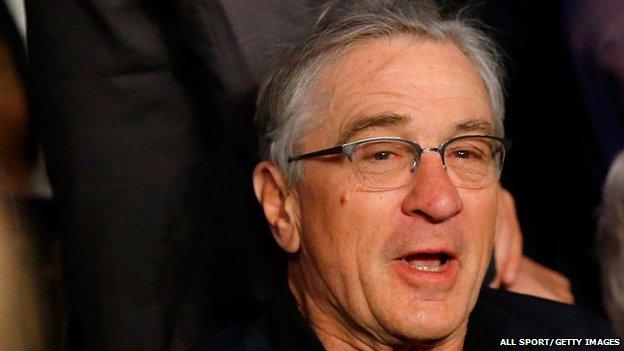
Robert De Niro was a lone male celebrity guest at the Bentonville Film Festival
New figures released show that Hunger Games actress Jennifer Lawrence was being paid $20m (£12.5m) for her new film Passengers - double the fee of her leading man, Chris Pratt.
However, voicing concerns about deeper inequalities between men and women working in Hollywood has become a recurring theme, with Patricia Arquette speaking out against a "gender pay gap" during her Oscar acceptance speech in February.
Meryl Streep also recently announced she was starting a screenwriting fund for women over the age of 40, because she claims the industry lacks female voices and parts. Streep also suggested that it was harder for a male audience to identify with female characters - something Geena Davis disagrees with.
"My twin boys, who are 11 - their favourite film is Frozen," she says. "But I do think is that a lot of male screenwriters are afraid of writing a female part, of getting her wrong, giving her flaws, or deliberately making her unlikeable. My response to that is just create more of them.
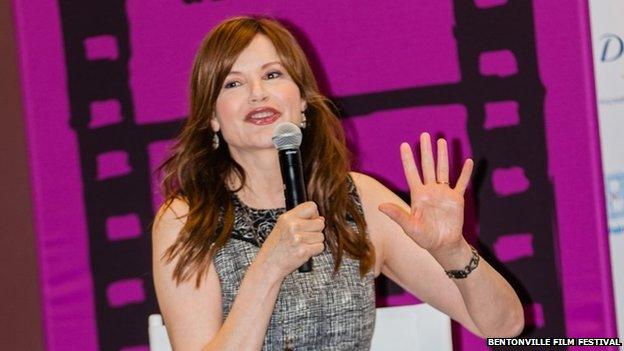
Davis promises the festival will return for a second time next year
When there's a lot of women on screen, it doesn't matter if they're not brave, or strong, or likeable, or clever. It just matters that they're there."
Denying "there's a plot in Hollywood against women - any bias is totally unconscious," Davis relates that when she meets executives with her research, she "gets two reactions".
Either they say "oh we've fixed it", and they name something like The Hunger Games as an example, or their jaws hit the floor. I just want what we see on screen to reflect the make up of the world's population.
"Obviously, if you're making Saving Private Ryan, that's a different matter. But in crowd scenes, why can't half the President's council be women? This industry is literally the only one that can see overnight change and I do think it will happen."
Robert De Niro was a lone male celebrity guest at the Bentonville Film Festival, after coming to present a HBO documentary about his artist father.
Friends actress Courtney Cox was also present, along with Davis's co-star Rosie O'Donnell from A League of Their Own, for a special screening at Bentonville's baseball park. The winning feature was a female-directed feature, Jack of the Red Hearts, about a young runaway girl, starring Famke Janssen. Davis promised the festival would return next year.
"I never meant to go so far with this, but I'm glad I did," she says. "My kids are so used to it now. When I watch TV with them, if I even start to lean over, they roll their eyes and say, 'yeah Mom, we know - there's not enough girls.'"